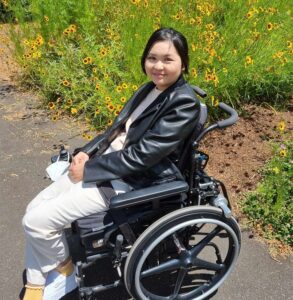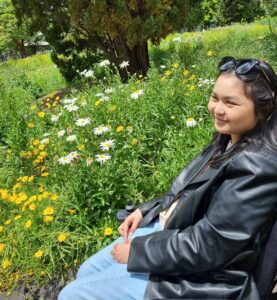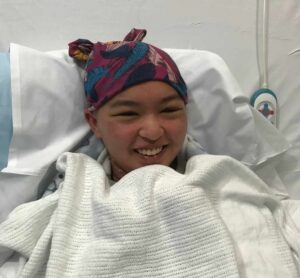There was never a moment anyone told me, “You are now disabled”
 Christie Yu was 18 years old and studying pharmacy when she became run down, attributing it to balancing university and her other commitments.
Christie Yu was 18 years old and studying pharmacy when she became run down, attributing it to balancing university and her other commitments.
“That was until I became really sick,” says Christie. “I was vomiting all the time and became really sensitive to light. I couldn’t get a blood test from the GP because I was so dehydrated, so Mum took me to the emergency room. There, I was diagnosed with acute myeloid leukaemia.” Acute myeloid leukaemia (AML) is a type of cancer that affects the blood and bone marrow.
Christie was immediately put into intensive care and started treatment. She eventually moved on to outpatient chemotherapy before requiring a stem cell transplant.
“They couldn’t find a perfect stem cell donor, so they used my dad’s cells. Thankfully, the transplant was successful and I achieved remission. But then I developed graft versus host disease (GvHD), which meant a three-month stint in hospital.” GvHD occurs when the donated cells (the graft) see your body cells (the host) as unfamiliar cells that need to be destroyed.
To treat the GvHD, Christie was put on high-dose steroids. “I had a lot of unfortunate side effects and complications. I developed osteoporosis and necrosis in a couple of joints.”
Christie also caught a superbug, which infected her already vulnerable hip joints.
Ever since, she has been reliant on a wheelchair every time she goes out. At home, Christie uses crutches.
“Even though my doctors explained the complications from my blood cancer treatment, no one exactly looked me in the eye and said, ‘You are now disabled. You must accept this, adapt, and learn about the implications of this disability’.”
Emotional challenges remain broadly unspoken

She has been using the Leukaemia Foundation’s new Online Support Service, designed to help patients navigate blood cancer. The service comprises a series of learning modules, an online energy coach to help patients manage fatigue, a health service directory of blood cancer professionals around the country, and an online chat function, connecting people with the Leukaemia Foundation’s Blood Cancer Support Coordinators. This is a team of trained healthcare professionals, specialising in blood cancer-specific support.
“The support service hosts a range of sources for psychological support, including mental health advice in different learning modules. It also connects people with counsellors and psychologists.”
“The ‘emotional resilience’ learning module will really help equip patients to manage their mental health and identify at what point to seek additional help. Emotional resilience is so important at all stages of cancer, from diagnosis to survivorship or even end-of-life care.”
“I was also impressed with ‘new normal’ learning module. It captures many unspoken difficulties of survivorship, like the loss of the hospital support network and grappling with what you have experienced.”
“Life hasn’t just ‘paused’ during treatment and then started playing upon remission. Our bodies have changed. Our support networks have changed. Our perspective of life may have changed. We may have developed treatment-related complications and disabilities. We fear future relapse.”
“The complexity of survivorship is that these are all tangible sources of grief and anxiety. Although we may have avoided the fatal consequences of cancer, treatment immensely strains us physically and psychologically afterwards, more than we’d expect.”
The power of speaking about the good and not-so-good

“When survivor representation is overly skewed towards positive outcomes, like in the media, it can unintentionally invalidate the more difficult emotions cancer patients and survivors experience.”
“That’s another reason I liked the ‘new normal’ learning module in the Online Support Service. There aren’t a lot of resources about survivorship that really delve into uncomfortable topics and thoughts people might have.”
“I thought I was alone in grieving my old self and expectations of survivorship. And that I wasn’t being overtly positive enough. It created a barrier in talking to anyone about my grief. The learning module normalises these thoughts and makes you feel you’re not alone.”
If you are a blood cancer patient or carer and would like to explore the Leukaemia Foundation’s new Online Support Service, head here.
Last updated on November 15th, 2023
Developed by the Leukaemia Foundation in consultation with people living with a blood cancer, Leukaemia Foundation support staff, haematology nursing staff and/or Australian clinical haematologists. This content is provided for information purposes only and we urge you to always seek advice from a registered health care professional for diagnosis, treatment and answers to your medical questions, including the suitability of a particular therapy, service, product or treatment in your circumstances. The Leukaemia Foundation shall not bear any liability for any person relying on the materials contained on this website. Christie Yu was 18 years old and studying pharmacy when she became run down, attributing it to balancing university and her other commitments.
Christie Yu was 18 years old and studying pharmacy when she became run down, attributing it to balancing university and her other commitments.